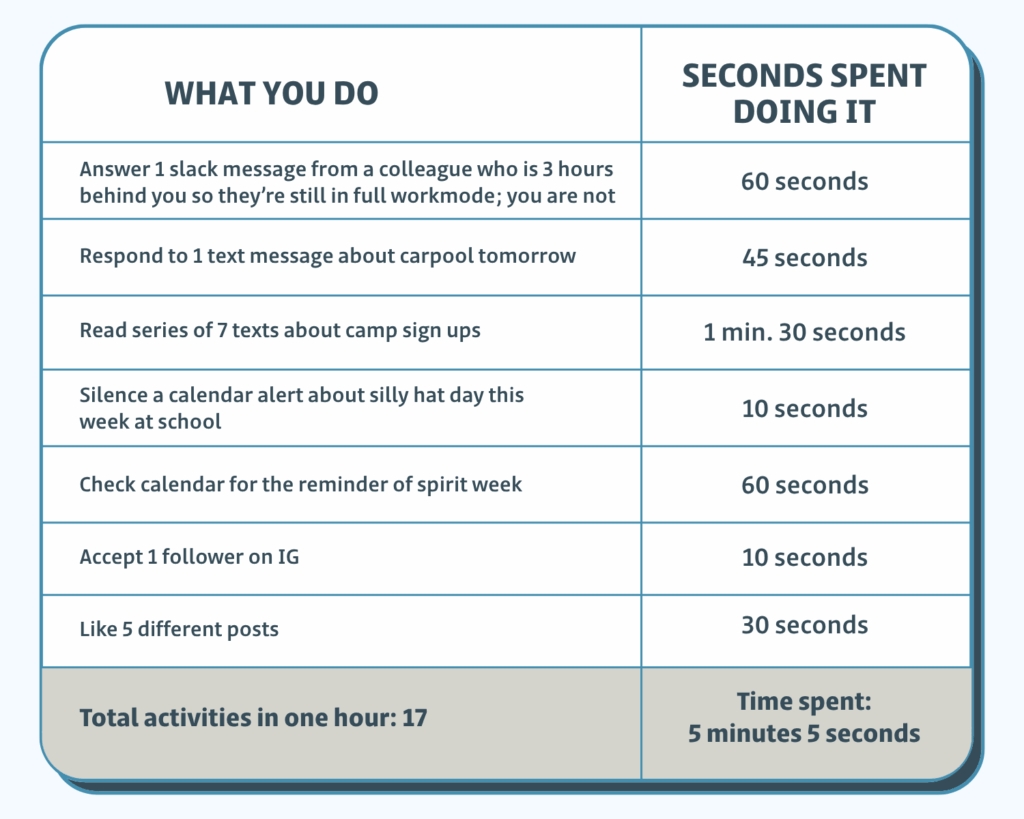Parenting in the Age of Time Confetti: Why It’s So Hard to Feel Present
- By Stephanie Fornaro
- June 19, 2025

For busy parents, our phones can be a lifeline: they allow us to Facetime with farflung family during our kids’ baseball games, sign up for summer camps right when registration opens, and sneak in Slack messages while chopping veggies. And while this on-the-go multitasking may appear efficient, default parents are all too familiar with this feeling of constantly doing something, yet rarely feeling like we’re actually getting anything done.
Brigid Schulte, author of Overwhelmed: Work, Love, and Play When No One Has the Time, calls this phenomenon time confetti. Time confetti is defined as small chunks of seconds and minutes lost to fractured, unproductive multitasking. As she puts it, time confetti means we’re trying “to do it all at once, all at one time” but in reality we’re ‘always on’ and never truly off.
Want to lighten your mental load but don’t know where to start? Take our 5-day guide to reclaiming your time and energy. Sign up for the free course here.
What Is Time Confetti?
Time confetti is much more than just multi-tasking and it’s not only our phones that are causing this phenomenon to persist. This fragmentation of our time is a byproduct of modern parenthood that leaves us feeling rushed and unfulfilled. As Schulte explains in Cosmopolitan UK, “I was feeling absolutely stretched – working full time plus at a demanding job, trying to be a present mother, trying to keep a house running, dealing with all that life throws at you. And I was cleaning up after my son’s 11th birthday party. We’d had poppers full of confetti – bright coloured bits and scraps of paper – and it just hit me – that’s what my time feels like. That’s what my life feels like. Bits and scraps of time, rushing from one thing to the next.”
If you’ve experienced the same as Schulte, you’re not alone. Dealing with time confetti hits default parents (who are often mothers) the hardest. Default parents often juggle professional responsibilities with the majority of household and childcare duties.
In fact, according to the Pew Research Center, most parents, including at least eight-in-ten mothers (86%) and fathers (81%), say they feel rushed at least sometimes. But for many mothers who work full time, feeling rushed is an almost constant reality. In fact, four-in-ten full-time working moms say they always feel rushed. This feeling of feeling rushed is part of what drives us to go, go, go in an attempt to maximize any interrupted time we may have. Our days are sliced into confetti-sized fragments by calendar notifications, Slack pings, snack prep, dentist appointment scheduling, a quick response to a work email, a field trip permission slip, a Zoom call, and then back to folding laundry or picking up from preschool.
Related: The Secret to More Fair Parenting? It Starts with These 5 Conversation Starters
The Real Impact of Time Confetti on Default Parents
To really visualize how time confetti may show up in your life, imagine you have one hour of free time after dinner from 7-8pm. During this time you adhere to your normal routine: give your kids a bath, clean up the kitchen and maybe read a book or play a game as they wind down before bed.
At the same time all of this is happening you also: answer Slacks, respond to texts, read texts, silence alerts and quickly check Instagram notifications. It breaks down like this:

While you may think it’s only five minutes, this equates to roughly 8% of an hour. And, over the course of a week this may add up to 35 minutes taking care of these mundane tasks. And zooming out, over a year that’s roughly 1,820 minutes or 30 hours and 20 minutes!
As Schulte explains, “The idea that we can or should be productive 24/7 is one of the greatest lies of the modern era,” stresses Schulte. “We aren’t machines. We can’t be, nor should we try to be ‘productive’ 24/7. That will only lead to mindless, endless busyness. Yes, you may be checking a bunch of things off your ‘to do’ list, but do you even know why you’ve put all of them on your list [in the first place]? Do you really need to? Where does all the busyness and frantic ‘productivity’ lead to?”
Parents are no stranger to that feeling of false productivity that stems from time confetti. It’s almost like we’re running on a treadmill but the mileage remains at zero even as we sprint farther and faster.
Erin L., mom of two, tells us, “We have a no phones policy at dinner, but one day I was really behind on a work project so broke my own rule. I was trying to get my 5-year-old to eat, while attempting to answer Slack messages with my phone hidden under the table, all while my 7-year-old was telling me he needed to wear his Mets tee (which was of course dirty) for Sports day the next day. The minute my attention wasn’t on them, the boys started arguing and dinner quickly devolved. It was at that moment that I realized why we have a no phones at the table policy, and I stopped trying to multitask because it really was getting me nowhere—either at work or with my family.”
Why are modern parents adopting—and accepting—the mentality that we need to be productive at all times? Leisure time should be leisure time. We should enjoy dinner with our families, be able to read a book without the distraction of feeling like we’re missing notifications, and devote our attention to what matters: our kids and ourselves.
Related: Practical Tips to Build Your Own Village
Strategies to Manage Time Confetti
The first step to combating the negative effects of time confetti is being aware of it and now that you are, here are some actional strategies to help you manage your time more effectively, actually be productive and enjoy real leisure time:
Time block
One way to be intentional about your time is to time block. It’s exactly what you think it is: set aside specific portions of your day to accomplish certain tasks. Erin L. tells us about her time blocking strategy, “For my work I have multiple clients and ongoing projects so heavily rely on time blocking to achieve my goals and feel truly productive. For example, I block time in increments that align to what I need to get done. I’ll block 15 minutes to check Instagram, 30 minutes to check and respond to emails, 30 minutes to organize my Asana board every Monday morning, and up to 90 minutes to go heads down on projects. I add these blocks to my google calendar and do my best to say, not check Instagram outside of that time block. I even block out time for lunch and taking my dog for a walk. This method has helped immensely with my productivity and achieving some semblance of a work/life balance.”
Time blocking is about protecting your focus, being realistic about your bandwidth, and creating space for both work and free time.
Related: I Was a SAHM and Hired a Nanny
Accept you need support and hire exactly the type of support you need
Realizing you need help is not a sign of failure, but a sign of strength because one of the most powerful ways to reclaim your time and reduce time confetti is by acknowledging that you don’t have to do it all alone. Being smart and creating a sustainable strategy for your well-being is the first step to changing your own narrative.
Consider how your life (and the amount of leisure time you have) might change if you hired the right kind of support. For some, this might mean working with a professional nanny who can handle childcare with confidence and consistency and others this might look like hiring a family assistant who can take care of household logistics like grocery shopping, meal planning, or errands.
At Hello Nanny!, we help families think intentionally about their support systems. Do you need someone full-time or part-time? Do you need a nanny who can also prep dinner, handle school drop-off, or help with organizing your home? There’s no one-size-fits-all answer and that’s why we’re here The right support should meet your family’s unique needs so that your time isn’t just freed up, it’s enriched. Accepting support and hiring for what your family needs is one step to embracing the idea you don’t have to be productive or ‘on’ at every moment of the day.
Enjoy your free time—and make more of it
Repeat after me: Leisure time should not be a luxury. If you’re having trouble finding free time every day, we suggest starting small. Begin with 15 minutes a day of time that is just for you and/or your family. Go for a walk, bake, draw, play a board game, build with LEGOs—this time is meant for you to do anything that makes you and your family feel happy and good. It’s not meant to be used as a time to check off your tasks or quickly respond to a message. Leisure and free time is coveted and it’s important you prioritize it every day.
Unplug
One study cites that the average American spends 7 hours and 3 minutes looking at a screen each day, and personally, we think this estimation is conservative. While we know that unplugging is easier said than done, it’s highly probable that you’ll notice a difference in your mental health and productivity when you do disconnect—and not, just for one day. Make it a habit. Here are some tactics to unplug that I’ve found successful:
- Rely on an old fashioned alarm clock for your room (friends swear by this Hatch one) and leave your phone in another room (or even floor) all together when you go to bed. Some of our families even suggest using a timed lock box for their devices.
- Silence notifications on your phone starting at 8pm or a time that feels reasonable to you. Once you’ve paused notifications, no peeking.
- If you found social media as a culprit, try going a day, a week, or even longer without it. One way to do this is by deleting the app from your phone or changing your password to limit access and only giving this password to a trusted partner or friend.
Once you’ve unplugged and broken your habit of being connected, check in with yourself: how do you feel? What feels different and what feels the same?
Related: Mandatory Return-to-Office Policies Are Failing Mothers
Reclaiming Leisure Time: It’s Time to Shift Your Mindset
Time confetti may feel inevitable, but it should never feel unmanageable. The first step to reducing time confetti is shifting your mindset: productivity is not the measure of your worth, and rest is not something you have to earn. Modern parents have been conditioned to believe that every moment must be maximized and that we should be productive or ‘on’ 24/7. It’s time we move away from this narrative and shift our mindset.
By understanding how fragmented time impacts your well-being you’re one step closer to reclaiming something that’s been slowly chipped away: your time, your focus, and your joy. It’s time to start making small but meaningful changes that help you feel more grounded, more present, and more like yourself. This means setting intentional boundaries, hiring the right support, and building in true leisure (even if that leisure means sitting on the couch without your phone in silence).
So go ahead: you have our permission to log off, ask for help, and enjoy that book, walk, or game night. Your time is yours and yours only to reclaim. And it all starts now.
Please follow and like us:
You may also like…
- By Stephanie Fornaro
- By Stephanie Fornaro
- By Blueberry Pediatrics


